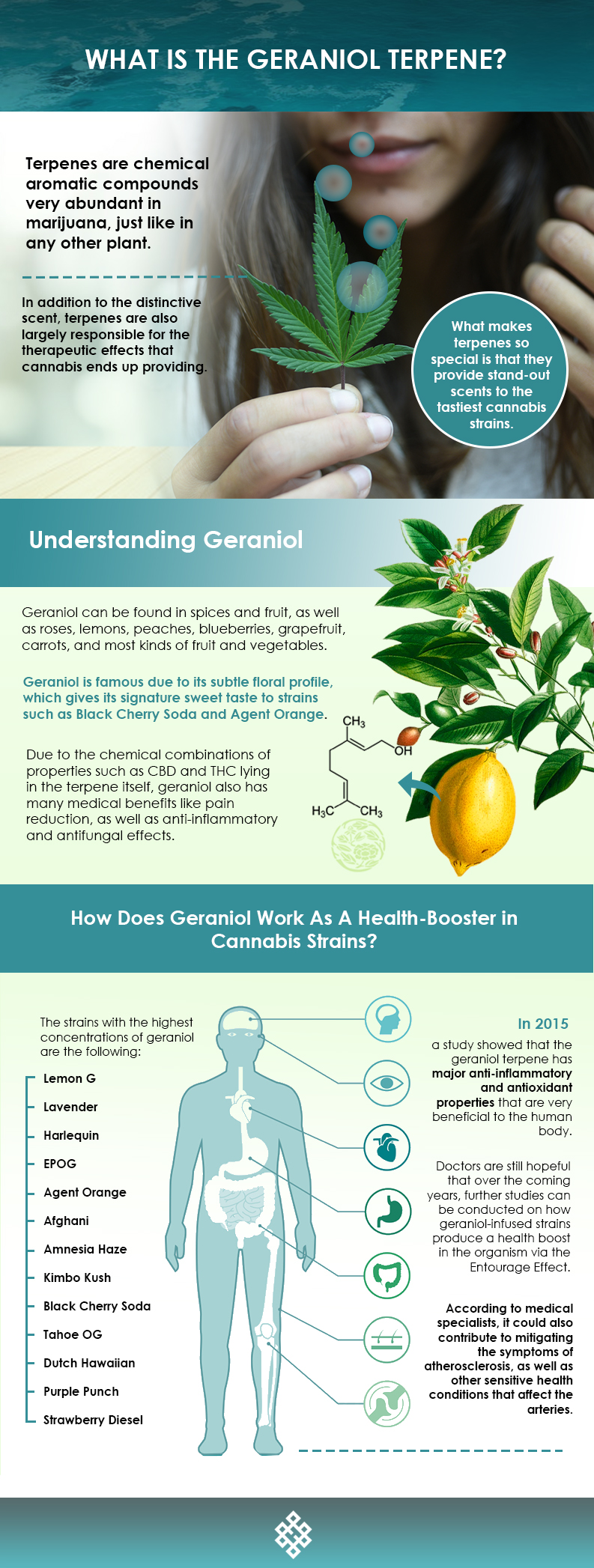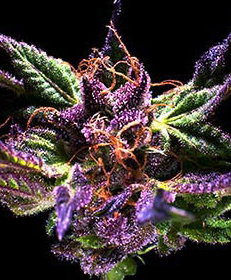
Over the years, Geraniol has been the focus of scientific studies seeking to determine how much of a beneficial health effect it has when cannabis strains. Although scientists and doctors consider that it’s still too early to tell, what data has found shows promise in regards to how geraniol operates. In 2015, a study showed that the geraniol terpene has major anti-inflammatory and antioxidant properties that are very beneficial to the human body.
There are other forms of terpenes which are better known among customers  and cannabis enthusiasts, such as myrcene or limonene. Although geraniol isn’t as famous as these terpenes, it’s still one of the healthiest and most significant out there. Geraniol can be found in spices and fruit, as well as roses, lemons, peaches, blueberries, grapefruit, carrots, and most kinds of fruit and vegetables. It is often the case that manufacturers add geraniol to different products because of its fragrance. Articles such as perfumes, candles, and even soaps can contain geraniol. Similarly, pastries and desserts often make use of geraniol’s scent to expand on the quality of taste.
and cannabis enthusiasts, such as myrcene or limonene. Although geraniol isn’t as famous as these terpenes, it’s still one of the healthiest and most significant out there. Geraniol can be found in spices and fruit, as well as roses, lemons, peaches, blueberries, grapefruit, carrots, and most kinds of fruit and vegetables. It is often the case that manufacturers add geraniol to different products because of its fragrance. Articles such as perfumes, candles, and even soaps can contain geraniol. Similarly, pastries and desserts often make use of geraniol’s scent to expand on the quality of taste.
Geraniol is a terpene found in numerous species of flowers, fruits, and vegetables. ... Geraniol is also produced by bees who use its aroma to mark their territories. It has a fruity, floral, sweet, and citrusy scent.
What Else?
⦁ Geraniol is an acyclic monoterpene alcohol (but don't drink it!).
⦁ Geraniol is found in essential oils in plants like Geraniums, Palmarosas, Java Citronell, and Roses.
⦁ Its sweet, floral, and citrusy notes work well in perfumes and creams.
⦁ Geraniol is great for relaxation as well as a flavor enhancer for lemon, grapefruit, lime, and orange.
⦁ Geraniol candles can be 5x more effective than citronella candles at repelling insects.
⦁ It acts as an effective antimicrobial and antibacterial.
⦁ In its ability to fight free radicals, geraniol may have antioxidant, antitumor, and anticancer properties.
⦁ Studies have shown that geraniol can fight inflammatory responses in the body.
⦁ It smells great!
 You may be familiar with geraniol’s name since it hails from the geranium herb. This plant is very famous due to its citrus scent, and because it is often employed in farms to repel insects potentially affecting the crop. It is geraniol’s distinctive aroma what instills the interesting scent of rose and fruits within the cannabis strain. This effect tends to be more subtle than the stern aroma of citronella oil that can be found in geranium plants.
You may be familiar with geraniol’s name since it hails from the geranium herb. This plant is very famous due to its citrus scent, and because it is often employed in farms to repel insects potentially affecting the crop. It is geraniol’s distinctive aroma what instills the interesting scent of rose and fruits within the cannabis strain. This effect tends to be more subtle than the stern aroma of citronella oil that can be found in geranium plants.
Among all of geraniol’s properties, it is the distinctive scent of rose what makes this terpene a valuable commodity in the fragrance industry. Another component which helps this property stand out are the subtle citrus scents, which have found their way into the cannabis industry in a significant form.
Doctors are still hopeful that over the coming years, further studies can be conducted on how geraniol-infused strains provide a health boost via the Entourage Effect.
A more recent study showed that geraniol is among the most effective compounds in repelling fungi and bacteria. This study put geraniol up against 18 different forms of bacteria and fungi, and concluded that its antifungal and antibacterial properties were significant.
 Other major health effects have been associated with the use of geraniol, such as neuroprotectant and antiviral properties. Doctors believe that geraniol could be successfully employed against viral infections and some consider it’s probably already being used in that capacity today. A study conducted in 2016 also revealed that geraniol could help suppress the growth of cancer cells in different forms of this particular disease, especially colon cancer. If tested, this scientific achievement could produce one of the most significant medical breakthroughs in our lifetime.
Other major health effects have been associated with the use of geraniol, such as neuroprotectant and antiviral properties. Doctors believe that geraniol could be successfully employed against viral infections and some consider it’s probably already being used in that capacity today. A study conducted in 2016 also revealed that geraniol could help suppress the growth of cancer cells in different forms of this particular disease, especially colon cancer. If tested, this scientific achievement could produce one of the most significant medical breakthroughs in our lifetime.
Geraniol Even Has Antioxidant, Antitumor, and Anticancer Properties
Oxidation is a chemical process that occurs inside the human body. Oxidizing chemicals called free radicals can damage human DNA and other components inside cells. They’re thought to contribute to aging, arteriosclerosis, and asthma. So having lots of free radicals is NOT a good thing. In fact, free radicals are associated with cancer, Parkinson’s disease, Alzheimer’s disease, and more.
 Basically, the less free radicals you subject your body to, the less likely you are to develop certain cancers and diseases.
Basically, the less free radicals you subject your body to, the less likely you are to develop certain cancers and diseases.
This is where geraniols powerful antioxidant properties come in handy. Terpenes in essential oils act like assassins contracted to wipe out free radicals by scavenging them in your body. This neutralizes the free radicals, rendering them inactive and unable to cause damage.
What’s even more amazing is the effect that geraniol may have on tumors. According to a review published by the International Journal of Oncology, “geraniol sensitizes tumor cells to commonly used chemotherapy agents”. Geraniol may also have the ability to make it harder for cancer cells to become resistant to anticancer drugs. This makes geraniol a very promising compound for future study into multi-targeted anti-cancer treatments.
On a side note, geraniol has also been tested with animals thoroughly, especially on hamsters and rats. These studies have revealed that the terpene could potentially help in managing diabetes and hyperglycemia. According to medical specialists, it could also contribute to mitigating the symptoms of atherosclerosis, as well as other sensitive health conditions that affect the arteries.
amazing trichomes magnified photo above